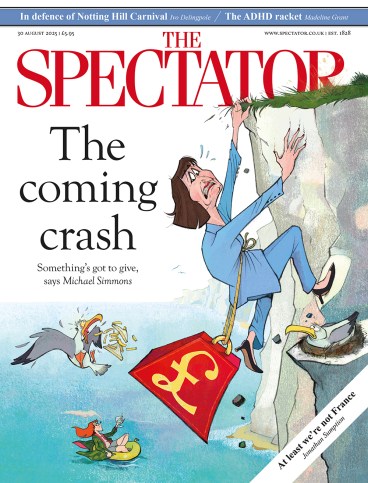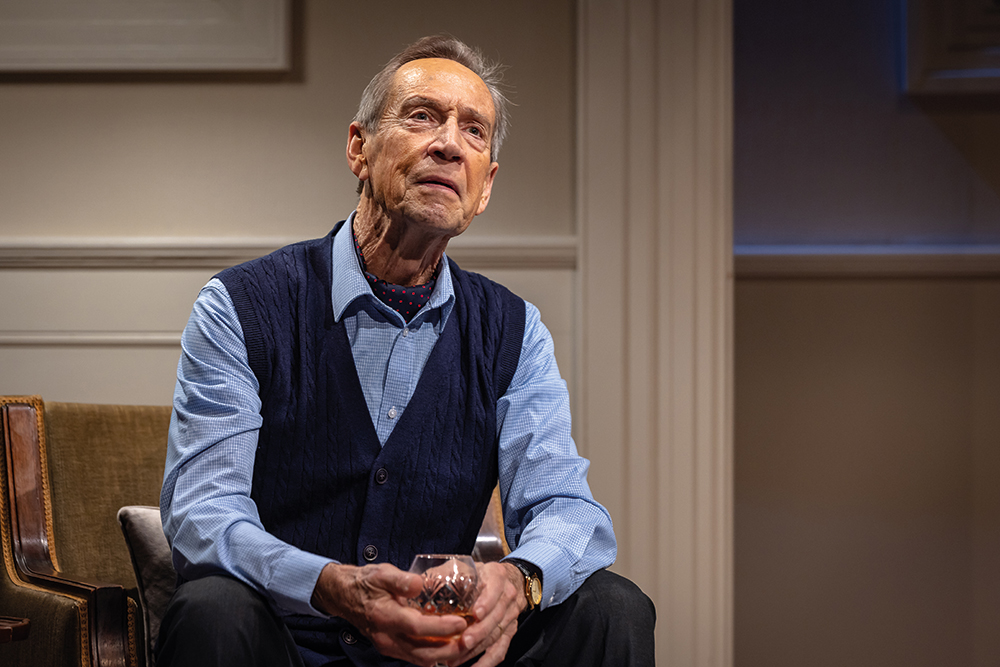
Chekhov with an English accent. That’s how Andrew Keatley’s play, The Gathered Leaves, begins. The setting is a country house where a family of recusant English Catholics meet for a weekend of surprises and high drama.
The audience was on its feet, cheering and clapping, some of them in tears
At first, the main conflict seems a little flimsy. William Pennington, a pompous grandee born in the 1920s, won’t forgive his children for being who they are. His daughter Alice scooted off to the south of France where she raised an illegitimate girl whom William has never met. His sons, Giles and Samuel, were sent to boarding school where Giles had to protect the autistic Samuel from bullies who mocked his eccentric behaviour. Samuel now lives in a sheltered flat where Giles visits him twice a week to keep their friendship alive. William can’t accept this set-up and he belittles Giles for treating Samuel with selfless and heroic compassion. How twisted is that. And yet, how like life.
The elegant set designed by Dick Bird breathes old money. A grand country house like this ought to be lined with ancestral portraits but the sight of painted faces on the walls would distract the audience. The solution is to leave oblong recesses where the paintings might have hung and to let these empty shapes create an air of emphatic but anonymous magnificence. You’re not supposed to notice this detail but it affects you unconsciously.
A similar trick has been played with the script which features two adulterous romances, one historic and the other ongoing, that don’t lead anywhere. They just linger inertly. Might they be mistakes? No, the playwright added these details to give a sense of naturalism to the play, to make it feel more real – because everyone’s life includes unexplored avenues and mysteries without answers.
Adrian Noble’s mastery of this wonderful play extends to the performances. Richard Stirling is brilliant as the nerdy, obsessive Samuel who can never tell a lie. Zoë Waites plays Giles’s neglected wife, Sophie, as a wounded empress struggling to conceal her pain from her court of admirers. Her children (Ella Dale and George Lorimer) are brilliantly funny as a pair of bickering siblings who struggle to outdo each other while they play boardgames and wrap birthday presents. Dale is a particularly gifted young comic. Naturally funny. The top honours belong to Jonathan Hyde whose poetic, haughty, over-sensitive face presents William’s character in outline before a word is spoken. He’s a priggish tyrant who has to pass through the fires of experience to learn the true meaning of love and wisdom. If you can sit unmoved through the final reconciliation scene you must be a robot.
At Park200, the seats are within touching distance of the stage and the actors can see what effect they have wrought as they take their bows: an audience on its feet, cheering and clapping, some of them in tears. That’s a good night’s work. Keatley is a special kind of dramatist. He starts by imitating Chekhov and ends up matching him.
Every Brilliant Thing is a monologue written by Duncan Macmillan and delivered by a variety of luminaries. On 21 August, the role was taken by Jonny Donahoe who began by touring the stalls and asking volunteers to recite phrases from numbered cards.
The show is not a drama but a semi-improvised parlour game about a small boy (Donahoe) who writes a list of pleasures to keep him occupied while his mother recovers from a suicide attempt. Cued by Donahoe, the playgoers recited the words on their cards which included simple enjoyments like eating ice cream, climbing trees, the smell of cut flowers, etc.
Artistically, it’s as demanding as listening to a knock-knock joke or reading the contents on a cereal box
These readings were broken up by scenes improvised by other members of the audience. One person played Donahoe’s father. Someone else played the vet who executed the family dog with an injection. A third volunteer played a man called Sam who became Donahoe’s husband later in life. Together they chose a pet dog and named him Metaphor.
The good-natured crowd enjoyed these larks and no one seemed to mind being mocked. One woman was told that she dressed like a university lecturer. Donahoe plonked himself down beside a man and a woman in their sixties. ‘Nice old couple,’ he announced. The man smiled. The woman didn’t.
This is a cheap show to produce because no rehearsals are needed and the running costs are low. The audience plays the roles that might have gone to professional actors. Artistically, it’s as demanding as listening to a knock-knock joke or reading the contents on a cereal box. Harmless fun for grown-ups who want to spend 90 minutes back at nursery school. At the same time it breaks the covenant between the audience and the producer. We go to the theatre to experience a night of entertainment, not to provide it. The playgoers should bill the venue for their time.








Comments